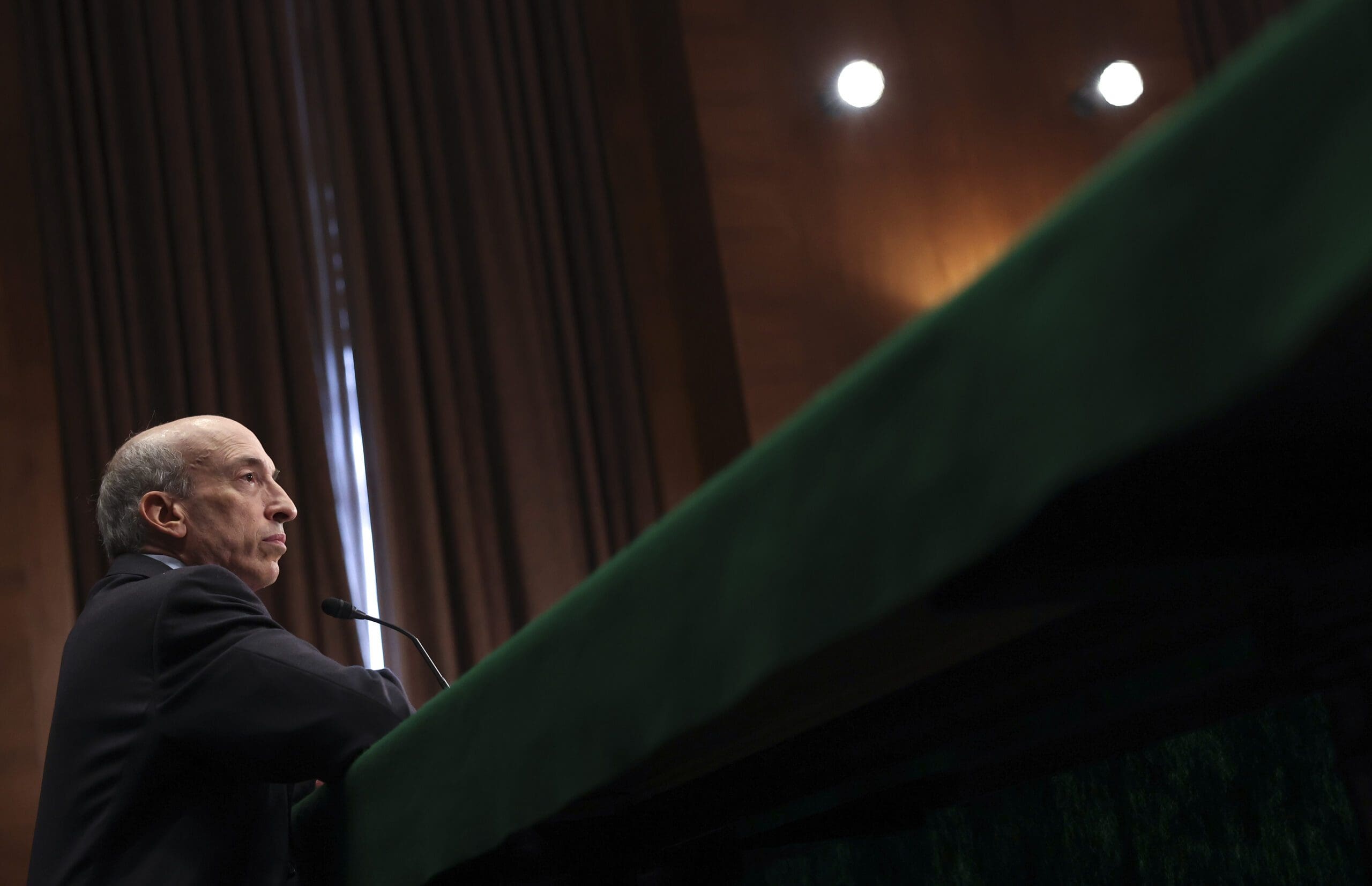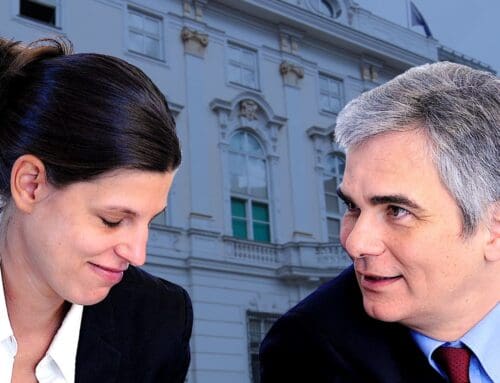
SEC chair riles Wall Street, Republicans — even some Democrats
SEC Chair Gary Gensler faces a growing political problem: He has a shrinking number of allies in Washington.
Wall Street and Republicans are out to get him, and even some Democrats are fuming. At the same time, Gensler is facing unrest among SEC staff over a growing workload and return-to-office policies.
Nineteen months after taking the SEC’s reins, Gensler, a veteran of the Clinton and Obama administrations, has drawn widespread ire thanks to an ambitious regulatory agenda poised to shake up much of corporate America. The SEC is pursuing new rules that would force companies to disclose their carbon emissions and fundamentally revamp the stock market’s inner workings.
Gensler’s regulatory push has triggered public threats of litigation from Wall Street executives and warnings from their friends in Congress. He’s even under pressure from long-time progressive allies who want to make sure he doesn’t compromise when it comes to cracking down on big business.
“I’ve literally in the last 48 hours heard fear of Gary Gensler from a number of industry players and heard frustrations with Gary Gensler for not being aggressive enough from a U.S. senator,” said Rep. Jim Himes (D-Conn.), who called Gensler “one of the smartest guys” to lead the SEC.
The growing list of gripes about Gensler threatens to weigh on his political capital as he tries to finalize sweeping regulations opposed by industry, navigate upcoming House GOP investigations and secure his agency’s role in overseeing digital assets as Congress responds to crypto exchange FTX’s failure.
“Gary Gensler might as well bring a cot because he’s going to be spending a lot of time in front of the [House Financial Services Committee],” said Rep. Tom Emmer of Minnesota, the incoming No. 3 House Republican.
Progressives and investor advocates eager for a Wall Street crackdown have spent a decade holding Gensler up as the model regulator.
In the Obama administration, the former Goldman Sachs partner won over the left at the Commodity Futures Trading Commission, where, following the 2008 financial crisis, he frequently clashed with Wall Street and Capitol Hill while pushing through new rules for derivatives that had fueled the meltdown.
Now, nine years after he left the CFTC, Washington is getting reacquainted with Gensler’s hard-charging ways.
The SEC chair has framed his agenda as a way to make markets more fair for investors, whom he says have suffered from the strengthening grip of a few Wall Street middlemen, conflicts of interest and gaps in transparency.
“Our clients are the 330 million people in our great nation,” Gensler said at an industry conference in October. “Americans benefit from more competition and efficiency in our markets.”
Gensler has plenty working in his favor today. Top Democrats are turning to him for answers on FTX’s collapse, after he warned for more than a year about pitfalls in the crypto market. House Republicans may lob subpoenas his way, but in a divided Congress will have a limited ability to rein in the agency. And many of the brewing policy fights rattling industries revolve around still-pending proposals, giving Gensler time to address his critics.
But the fights are adding up.
The seemingly rapid pace of new rules has triggered pushback from Republicans and Democrats, though rulemaking in the Gensler era is about on par with what prior chairs have done. A dozen Senate Democrats, including Raphael Warnock of Georgia, Kyrsten Sinema of Arizona and Mark Warner of Virginia, urged Gensler in September to slow down and give the public time to evaluate the rules.
Gensler’s plans to overhaul the stock market’s plumbing have triggered litigation threats from financial intermediaries who stand to see their businesses upended. Virtu Financial CEO Doug Cifu described in a recent interview a potential “conga line to the D.C. court.”
Gensler is also leading a crusade against crypto, a market he describes as rife with fraud, abuse and inadequate oversight. He has argued that most tokens are investment products the SEC already has the power to regulate, leading the chair to call — to no avail — for crypto trading platforms to register with the SEC like stock exchanges.
The digital currency crackdown has made him a polarizing figure in the industry. Coinbase CEO Brian Armstrong accused the SEC in 2021 of „engaging in intimidation tactics behind closed doors” after the agency effectively killed the exchange’s plans for a crypto lending product. Digital asset lending has since been rocked by volatility and bankruptcies.
The SEC has been encouraging crypto exchanges to register with the agency on a voluntary basis because officials want to avoid litigation with a large segment of the industry they believe is breaking the rules, according to a source familiar with the matter. The source, granted anonymity to discuss internal SEC deliberations, said the agency will likely start bringing enforcement actions against digital asset exchanges in 2023, given that it takes about two years to build a case.
One of the biggest scuffles to date is over a landmark proposal to require certain public companies to disclose their carbon footprints.
The plan, which has broad support from pension funds, environmental activists and progressives such as Sen. Elizabeth Warren (D-Mass), is intended to address investor calls for more transparency into companies’ sustainability practices. The proposal comes amid a growing focus on the economic effects of climate change.
However, big banks, oil giants and business groups like the U.S. Chamber of Commerce have lined up against the proposal. House Republicans are planning to make the SEC’s handling of climate issues a top target in upcoming investigations. The fight has also triggered pushback from top Democrats like Sens. Jon Tester of Montana and Joe Manchin of West Virginia.
Rep. Jake Auchincloss (D-Mass.), a member of the House Financial Services Committee, is worried the proposal could amplify “green noise,” or meaningless corporate disclosures for investors.
“To galvanize investors and regulators around clean energy and climate action,” Auchincloss said, “we need standards that produce signal, not noise.”
Progressives are keeping a close eye on Gensler to make sure he doesn’t back down.
Environmental groups and Democratic senators like Warren, Ed Markey of Massachusetts and Cory Booker of New Jersey have called on the SEC to strengthen the proposal.
While industry groups are expected to sue to block the plan once it’s finalized, activists may also turn to the courts if it is “unnecessarily weakened,” said Ben Cushing, fossil-free finance campaign director for the Sierra Club. Cushing declined to comment on whether that would include the Sierra Club.
Gensler has at times rattled some on the left.
Jeff Hauser, who scrutinizes executive branch appointments as head of the Revolving Door Project, said Gensler has not been perfect — citing the chair’s decision to pick a corporate defense lawyer to lead the SEC’s enforcement unit. She resigned days later after it came to light that she was admonished by a judge in a case where she was representing Exxon Mobil against Indonesian villagers.
But Hauser said Gensler is now “making the right enemies.”
The SEC chair has pursued an aggressive enforcement strategy “in the face of unrelenting criticism, almost all of it undeserved, and a lot of it coming from elected officials who should know better,” said Better Markets CEO Dennis Kelleher.
Warren said in a statement that, after the FTX debacle, Gensler and the SEC “must remain firm and use their broad regulatory authority to enforce the law and hold corporate executives accountable for wrongdoing.”
Inside the SEC, Gensler is also facing hurdles.
An October report from the SEC’s inspector general detailed concerns from agency staffers and managers about how the uptick in rulemaking was stretching an already strained workforce.
„He can cut through bureaucracies and get the results he wants in the short term,“ said one former regulator who worked with Gensler. „But the long-term impact of that is he leaves behind a lot of internal friction, resentment and labor problems that somebody else will have to deal with afterwards.”
Gensler has been lobbying lawmakers for more money to build up the agency’s staff, which shrunk by 4 percent between fiscal 2016 and 2021. He has cited the agency’s increased workload around blank-check companies, crypto and private funds as a justification for more resources.
The SEC’s union of 3,500 staffers is fighting Gensler over how to return to the office and what to do about paid time off that accrued during the pandemic. Greg Gilman, an SEC enforcement attorney who leads the union, said SEC management’s “apparent lack of concern for human capital issues” is now boiling over.
„We are not eager to have a big fight with him,“ Gilman said. „I’ve spent a huge portion of my career here, and I have a lot of dear friends that work here. I actually care about our mission. But I’m not going to shirk it: It’s either capitulate or fight.“
Sam Sutton contributed to this report.







